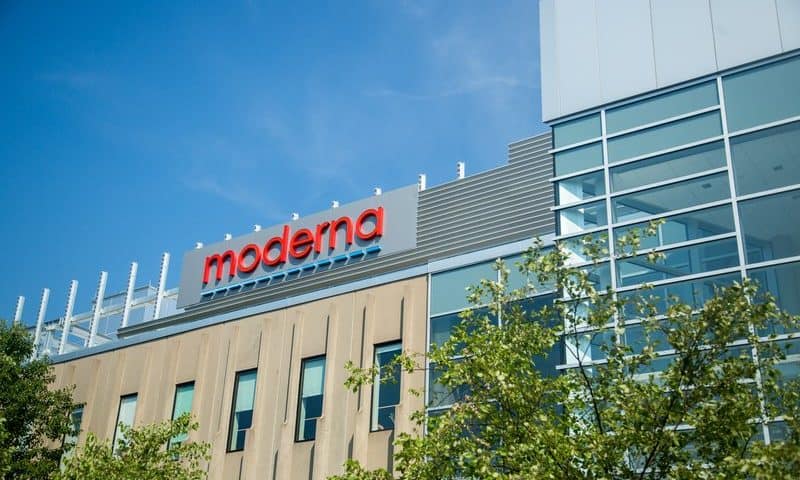Moderna’s market cap hit $100 billion on Wednesday, briefly matching Big Pharma GlaxoSmithKline, as the pandemic cements the once controversial biotech into a major behemoth.
Instead of Paris and London, it’s London and Cambridge (Massachusetts), but Britain’s GSK and U.S.-based Moderna (with a French-born CEO) couldn’t have more contrasting fortunes.
Moderna, no stranger to megabucks with its not-so-humble beginnings as a former unicorn, major $600 million-plus IPO and latent promise of new but largely untested mRNA tech, began its Wall Street life in the mid-teens a few years back after going public.
Before this, the company had raised hundreds of millions of dollars with a host of cancer vaccines and infectious disease vaccines, though much of this was preclinical or very early-stage. There were continuing questions over how much this was pumped up to gain swag, rather than having actual raw, approvable science.
Three years later, and Moderna’s now trading at nearly $250 a share (up 1,226% since its debut), and yesterday briefly hit a market cap of $100 billion, matching GlaxoSmithKline.
What’s changed in three years? In short, the pandemic, which confirmed the mRNA tech from latency to the Real Thing and saw the Moderna vaccine become one of the first to show amazing efficacy against SARS-CoV-02 with a nine-month turnaround from virus sequencing to being in arms, turning doubters into believers.
And Moderna is no one-trick pony, with plans to use the mRNA tech in other infectious diseases, such as flu, hopefully with stronger efficacy than current vaccine models are able, and also in cancer, using therapeutic cancer vaccines against a range of targets (though this will certainly be a tougher proposition to pull off).
The company will bring in tens of billions for its vaccine and any boosters it may be asked to make; though, it still has only one product—which isn’t even approved, with emergency use grants—at least for now.
Now, contrast this with Big Pharma GSK, which has an entire vaccine unit that’s one of the best-known in the world, a series of cancer assets and approved meds; a biotech buyout worth $5 billion in Tesaro; some major names from across the R&D world; and a history that can be traced back to the 18th century.
How can these two very different companies have the same market cap? For GSK, the story is both the pandemic but also its recent miserable run in R&D. While getting off some notable approvals of late, it’s also had some major flops, including two dud tests for a multibillion dollar partnership with Germany’s Merck KGaA in oncology.
GSK is also dragging up the rear in COVID vaccine work: You would have expected the well-known vaccine maker to be the first to work on and gain approval for a COVID shot, but the company appeared to dither last year, instead giving out some of its tech to biotechs to work on a vaccine. GSK eventually partnered with Sanofi on a pandemic vaccine, only for this to stumble in a key trial.
They later rectified the issue but only started late-stage testing this year. The shot will likely only be used—if even needed—as a booster shot. At the start of the pandemic, mRNA tech looked like a gamble, and one GSK didn’t want to take. It soon became clear this was the right tech for COVID. GSK has now signed up with Translate Bio and CureVac for the technology, but this isn’t leading innovation, simply following the pack.
CEO Emma Walmsley is under immense pressure: Activist investor Elliott Management wants her out, or at least to make major changes, as the company struggles to excite.
Of course, Moderna’s valuation is under more threat than GSK: It still only has the one drug on the market and changes in reimbursement, booster policies and usage can quickly and dramatically see billions cut from its market cap. It’s pipeline too is no sure thing; there is still a lot of risk here, and they will inevitably see setbacks and failures in the clinic.
And its mRNA tech is now out of the box: Many other companies are buying into it, such as Pfizer via BioNTech, and Sanofi with Translate Bio, and too are targeting cancer and flu; with big valuation, comes big responsibility.
This is why GSK has more of a cushion, but its pressures are more long-term and subject to erosion, rather than short, sharp shocks that biotech investors will know so well. Still, this was a major moment for Moderna and for biotech, showing how quickly fortunes can rise and fall and how rewards for innovation can still hold true.

